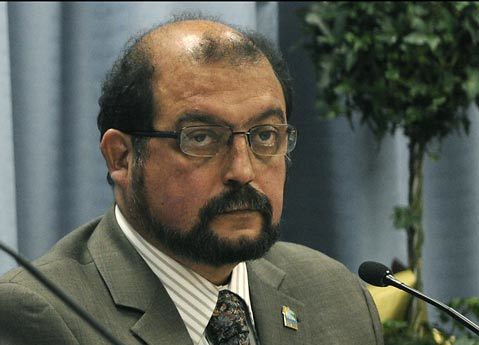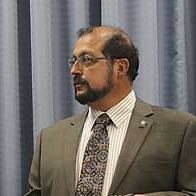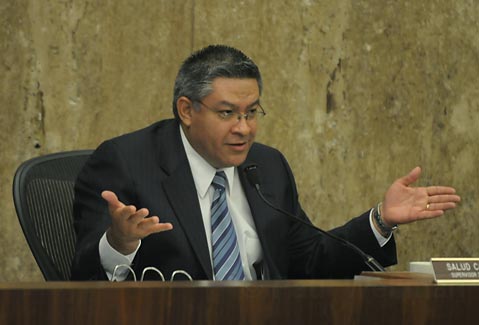
Although disappointed by the decision, Tariq Falfal said he isn’t surprised that the county won’t take any action over an incident during which Goleta City Councilmember Roger Aceves allegedly referred to him as a “turban-head.” “I knew this was going to happen,” he said Wednesday. “If the county is doing its own investigation on itself, it’s not going to admit wrongdoing.” Falfal had filed a discrimination complaint with the County Counsel’s office, implicating Supervisor Salud Carbajal — who purportedly heard the comment firsthand — for not speaking up.
On April 15, Falfal — a 22-year-old Motor Pool Dispatcher who’s worked at the County Administration Building’s parking lot for four years — and Aceves got into a brief argument about where Aceves had parked. Aceves admitted the altercation got his blood boiling, and that afterward he told Carbajal he needed to rein in his employees, but denied ever referring to Falfal in a derogatory manner.

Rather than calling Falfal a turban-head, as an unnamed county employee who overheard the conversation and reported back to Falfal alleged — she purportedly heard Aceves angrily say, “Someone needs to do something about that turban-head” — the Goleta councilmember claimed he simply described Falfal as the employee “with the turban on his head” for clarification purposes. Falfal said he’s never worn a turban before, which was corroborated by multiple county employees, but sometimes sports a beanie.
Following the incident, Falfal — who is half Libyan — got the ball rolling on an investigation that was conducted jointly by County Counsel and the Equal Employment Opportunity Office. In legal terms, Falfal alleged he was subjected to harassment in his workplace based on a purported discriminatory statement that was “derogatory of this race, color, and ancestry.” While he didn’t have specific requests for corrective action, he mentioned more than once that a simple acknowledgement of wrongdoing would have been enough to quell his anger and disappointment.
In a report issued on July 9, county counsel Victoria Tuttle wrote that, although Aceves admitted using the words “turban” and “head” for identification purposes, “it cannot be substantiated that the words were used in the alleged pejorative manner.” Even if the allegation turned out to be true, she wrote, it is unlikely that it would rise to the level of a violation of state or federal law because the conduct was not “severe or pervasive enough to alter the conditions of [Falfal’s] employment and create an abusive work environment.”
No one else in the elevator — where the debated statement was supposedly made — could corroborate that Aceves used the term turban-head, states the report. In fact, claimed Aceves, he never mentioned the word “turban” inside the elevator; that portion of the conversation, he said, “definitely” occurred outside the county building in the parking lot. Security cameras show the whistle-blowing employee wasn’t anywhere near Aceves when he was outside, but that she slipped onto the elevator just before the doors closed.

Also in the elevator, the report states, were “at least two other gentlemen wearing business suits,” one of whom recalled, “Aceves being agitated about a parking situation while in the elevator but believed he was joking about his level of frustration.” While the other man in the business suit remembered that the bulk of the conversation occurred out in the lot, the report says, Carbajal said he recalled, “Aceves still appeared agitated about the interaction while on the elevator and kept bringing the conversation back to the issue.” Carbajal went as far as to say that he never heard Aceves use the word “turban” at all.
In the section of the report that deals specifically with Carbajal’s role in the incident, Tuttle ruled that the accusation against him — that he heard a bigoted comment but didn’t do anything about it — was similarly unsubstantiated. The anonymous employee claimed Carbajal tried to talk Aceves down by saying something along the lines of “Okay, I’ll look into it” or “I’ll say something,” but Carbajal stated he never specifically tried to placate Aceves and instead attempted to change the topic of conversation. One of the other men in the elevator said he remembered Carbajal offering some kind of response, but couldn’t remember exactly what it was. Calls to the County Counsel were unreturned as of press time.
While the report essentially closes the door on the county’s involvement with the issue, Falfal said he plans to appeal the case to the Civil Service Commission, an independent, quasi-judicial body that oversees employment relationships between Santa Barbara County and its workers. “I just wanted a little acknowledgement,” said Falfal. “I want to get the information out there so people can vote with the full picture.” Aceves is currently running for reelection to Goleta’s City Council.
Falfal said that throughout the investigation, everyone he talked to was fully supportive, including his coworkers and manager. But that, he said, wasn’t enough to ensure justice was served. Of the departments that looked into the matter, “They want the county protected,” he said. “Salud is more important than a dispatcher.” Recently, claimed Falfal, Carbajal has been noticeably friendlier, purportedly greeting Falfal in the lot, which he never did before. Aceves, though, has yet to speak face-to-face with Falfal since things went down. Recently, relayed Falfal, Aceves failed to check in with the parking employees, as is standard protocol, when he arrived for a meeting.
And while rumor has it that Aceves has expressed a desire to apologize to Falfal, the county employee said he’s not sure he’d be up for a conversation at this point. “I honestly don’t think I could talk to him,” he stated, mentioning that the last time he caught sight of the Goleta councilmember he couldn’t help but feel anxious and upset. “I didn’t think I’d get angry, but I did.”



